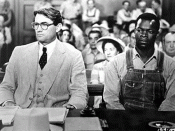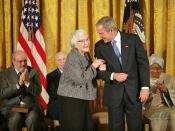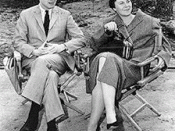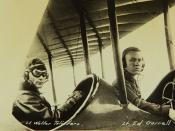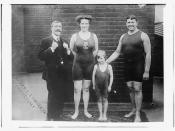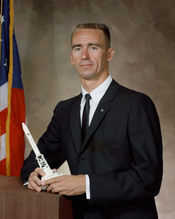Albert Einstein, a famous theoretical physicist, once said, "The world is a dangerous place to live; not because of the people who are evil, but because of the people who don't do anything about it." Human naivety and innocence often hide injustice and only furthers ignorance. We are often ignorant towards people around us because we are unable to understand our surroundings and empathize with those around us; thus, we pose a danger to the world because without understanding, the world will does not run as well as it could. However, innocence can be abolished, and awareness of those around us can be developed. In the historical fiction novel, To Kill a Mockingbird, by Harper Lee, the idea of empathy and innocence in children is explored, exemplified, and developed through the two main characters, Jem and Scout. The book covers the trial of a black man named Tom Robinson who is wrongfully accused of rape.
With the horrifying experience of the trial, the children change from an innocent state of mind to one that is much more mature and developed. This transition is only possible because of empathy, as empathy acts as the bridge of transition between innocence and moral awareness. Harper Lee's novel allows us to track the psyche of a healthy six-year-old who exhibits egocentrism, and her development into an individual who exhibits moral awareness by means of empathy.
When people are innocent, they are oblivious to the outside world; such obliviousness towards the outside world results in egocentrism. Jem and Scout both love to conjure false tales about Boo Radley. Boo Radley is their mysterious neighbor; He has been locked up in his house for countless years, and no one has ever seen him. Naturally, during the summer, the six-year-old Scout finds great pleasure in making up silly stories about Boo, the mysterious man. In fact, the two children contrive an entire plot about Boo. The plot ends with: "As Mr. Radley passed by, Boo drove the scissors into his parent's leg, pulled them out, wiped them on his pants, and resumed his activities" (11). This incident portrays innocence as a lack of worldly experience and knowledge, and Scout clearly exemplifies this. Because Scout lacks in worldly experience, she formulates frivolous stories about Boo. Her egocentrism is seen here because she can only see the world from her point of view. She is oblivious to Boo and his life; thus, she is unable to understand him, which further implies her egocentrism. She sees Boo as some horrible murderer, when Boo may be nice man in reality. However, Scout is not just oblivious to Boo, she is also oblivious to Walter Cunningham. Walter Cunningham goes to first grade with Scout, and his family is not as fortunate as Scout's. Although his family is extremely honest and hardworking, they do not have the same money that Scout's family has. While at school, Scout defends Walter when Miss Caroline Fisher, their first grade teacher, tries to give Walter money for lunch. Scout explains to Miss Fisher that Walter cannot take her money because he cannot pay her back. Although Scout does this kind deed, her teacher is ignorant and spanks her. Later on the playground, Scout is furious at Walter: "Catching Walter Cunningham in the schoolyard gave me some pleasure, but when I was rubbing his nose in the dirt Jem came by and told me to stop⦠'Why?' 'He didn't have any lunch'" (22). Scout's egocentrism is portrayed here as she is unable to understand Walter's predicament. Although it was kind of her to help him out, she should not have beaten him up just because she was scolded by Miss Fisher. In her encounter with Walter, Scout demonstrates her egocentrism. Her innocence is also seen in Walter Cunningham Senior's life. Later in the novel, during the weeks before Tom Robinson's trial, Tom is locked in Maycomb jail for extra protection. However, one night, a group of white men led by Walter Cunningham Senior go to the jail in hopes of lynching Tom. Fortunately for Tom, Atticus, Scout's father, is sitting outside of the jail reading a newspaper. As the lynching group prepares to commit a violent act, Scout and Jem pop out and begin talking about random matters. Scout begins to talk to Walter Cunningham about entailments: "'Entailments are bad,' I was advising himâ¦The men were all looking at me, some had their mouths half-openâ¦Their attention amounted to fascination⦠'Well Atticus, I was just sayin' to Mr. Cunningham that entailments are bad an' all that'⦠'What's the matter?'(154). The quote describes how the men are completely appalled at Scout's behavior; here they are, about to kill a man, and Scout begins talking about entailments and how they are bad. This is an obvious display of innocence and obliviousness because Scout misses the weight of situation around her. Violence is about to occur, and she rambles aimlessly about matters that really do not matter to Cunningham. Her lack of knowledge regarding the situation and her egocentrism shrouds reality; she only sees her own world and is unaware of the dangers. This moment reflects Scout's egocentrism and innocence. She only sees this from her point of view, and not from Walter's, Atticus's, or even Tom's. Scout's egocentrism is a threat to herself and the people around her because when she is unable to understand people around her, she is unable to make wise decisions that benefit the people around her. With this egocentrism, she will remain oblivious to others, which ultimately reveals her need to develop moral awareness.
Through empathy, people can transition from being egocentric to being morally aware. Scout constantly wonders why Boo Radley never comes out; she even tries to entice him out of the house by buying him ice cream. However, when she talks Miss Maudie about Boo, Miss Maudie looks at Boo from a completely different view: "'Arthur Radley just stays in the houseâ¦Wouldn't you stay in the house if you didn't want to come out?' (44). Miss Maudie explains to Scout the most obvious reason for why Boo stays inside; maybe he prefers to avoid the world outside. After all, prejudice and injustice thrive in Maycomb, and it is reasonable that Boo may not want be in it. Nevertheless, the more important point is how Miss Maudie views Boo's strange quirk. Scout merely thinks that Boo is some horrible man, but Miss Maudie, who is more morally aware, can sympathize and see from Boo's point of view because she feels empathy for him. However, Miss Maudie is not the only adult who exemplifies the bridge between egocentrism and moral awareness, Calpurnia does this as well. When Tom Robinson is convicted, he is unable to work and provide money for this family. Therefore, Helen Robinson, Tom's wife goes through difficulties trying to support their family. However, with Tom being convicted for rape, many people are hesitant to hire Helen because they do not want to associate with their family. The church Tom faithfully attends helps collect money for his family, but Scout is flabbergasted as to why this is necessary: "'Why were you all takin' up collection for Tom Robinson's wife?'⦠'Helen's got three little'uns and she can't go out to work--' 'Why can't she take 'em with her?' (123). When the Reverend asks for some money, Scout is unable to empathize with Helen's situation. Her egocentrism limits her perspective so she cannot see that Helen is unable to work because of Tom's conviction. Calpurnia, however, is more empathetic towards Helen's situation; thus, it can be concluded that with empathy, the world can be looked at from more perspectives, which ultimately leads more understanding. However, before any of this understanding is achievable, we must take many steps to being empathetic towards those who are prejudiced against. During the court case, Atticus does a brilliant job showing why Tom is innocent. Because Maycomb is such a prejudiced little town that shows no empathy, Atticus pleads for the jury to rule Tom innocent since the stereotype, or "evil assumption" (204), of "that all Negroes lie, that all Negroes are basically immoral beings, that all Negro men are not to be trustedâ¦lie as black as Tom Robinson's skin" (204), is clearly false. In order to understand this, one must achieve a level of empathy that only Atticus has attainted: ""'And so a quiet, respectable, humble Negro who had the unmitigated temerity to 'feel sorry' for a white woman has had to put his word against two white people's'" (204). Atticus is only able to reach this conclusion because of the empathy he has; he is probably one of the few people in To Kill a Mockingbird who actually understands Tom for who he is. Atticus serves as the link from egocentrism to moral awareness because he is also the man who emphasizes the idea of "understand a personâ¦climb into his skin and walk around in it" (30). Atticus is morally aware because he is able see things from a different point of view; he is not oblivious to the outside world. Empathy is the bridge, the rite of passage that one must pass in order to achieve moral awareness. Egocentrism is never abolished, is merely develops into moral awareness through empathy.
Once moral awareness has been developed, one can understand and empathize with others better. Moral awareness is a sense of what is right and what is wrong; with moral awareness comes empathy. After Scout learns and sees empathy in her life, she finally begins to apply it in her own world. When Scout enters third grade, she encounters an interesting teacher, Miss Gates. Both Jem and Scout describe her as "a nice lady" (246), but Scout's ability to empathize leads her to a different conclusion: "'It's not right to persecute anybodyâ¦Jem, how can you hate Hitler so bad an' then turn around and be ugly about folks right at home?'" (247). In this incident, Scout demonstrates her ability to think beyond herself. She realizes the discrepancy between what Miss Gates says at one time and what she says at another time. Not only does she demonstrate her lack of egocentrism, she also shows her ability to emphasize with others by recognizing the unfairness of the situation. After all, she does say, "It's not right to persecute anybody" (247). Her recognition of what constitutes fairness and her ability to empathize with Tom shows her growth from an innocent, egocentric child to one who has become morally aware. Scout's new ability of recognizing right and wrong exemplifies her new moral awareness. After Boo saves Scout from Bob Ewell's murder attempt, not only does Scout survive, she also gets to meet Boo. She even has the privilege of walking him back to his house. When she is there, she reflects upon the year's events and feels sad when she realizes that she never gave anything back to Boo: "Neighbors bring foodâ¦little thingsâ¦Boo was our neighborâ¦gave us two soap dolls, a broken watch and chain, a pair of good-luck pennies, and our lives. But neighbors give in return. We never put back into the tree what we took out of it: we had given him nothing, and it made me sad" (278). Scout feels bad because she realizes that even though Boo gave her many gifts and saved her life, she never did anything in return. Scout's world is no longer just her; it is also about other people and the fair treatment of others. She discovers the world beyond herself and feels bad that she has not given Boo anything in return. Her thoughts demonstrate moral awareness, the idea of what is right versus wrong. This new awareness helps her understand Boo; with that, she executes the final step of empathy, standing in another's shoes. After she drops Boo off at his house, she turns around and looks back on her small street. She reminisces about the past few years of her life, but instead of doing it from her perspective, like an egocentric child, she discards her old self-centered views and looks from Boo's perspective: "Autumn again, and Boo's children needed him. Atticus was rightâ¦you never really know a man until you stand in his shoes and walk around in them. Just standing on the Radley porch was enough" (279). Scout finally understands the concept of empathy, and steps into Boo's shoes and reflects back on the life as Boo has lived it over the past years. This ability reveals her total empathy with Boo, an empathy that is born out of a loss of innocence and egocentrism, and one that now allows her to stand completely in another's shoes. Scout's moral awareness is clearly exemplified here as she finally learns to empathize with others; her small step is crucial and vital as even the smallest deed can make a great impact.
The development of moral awareness is only possible with empathy, as empathy transitions innocence into awareness. Scout begins To Kill a Mockingbird as any normal six-year-old, she cares only about herself and her happiness. However, many people in her life demonstrate empathy to her, and she begins to see how empathy leads to understanding and more just actions. By the end of the novel, her growth is marked by her scene with Boo Radley. As she takes him home, she truly stands in his shoes and looks at the world with completely new eyes. Scout's new outlook on life is one that people in our world should adapt; with empathy and understanding, we can discard our old egocentric ways and make a bigger impact on the world. Life is not always just "me, myself, and I"; we all live in the same world, the same Earth, and even the smallest actions can make or break another's life. With moral awareness, our society can function better because we can step out of our confined world and look back with new insight. Lee conveys these simple, but crucial ideas with characters who reflect people in our own world; who has not discriminated against another colored person? Who has not been self centered at one point in their lives? No one. The issues presented in To Kill a Mockingbird are real issues that exist in our world. If we empathize, it will pull us out of our own little self-centered world; then we can truly understand the people around us and make positive impacts on the world. Let us take Einstein's words into consideration and make our dangerous world a safe one with understanding and action.
Bibliography:Lee, Harper. To Kill a Mockingbird. New York: J.B. Lippincott Company, 1960.
